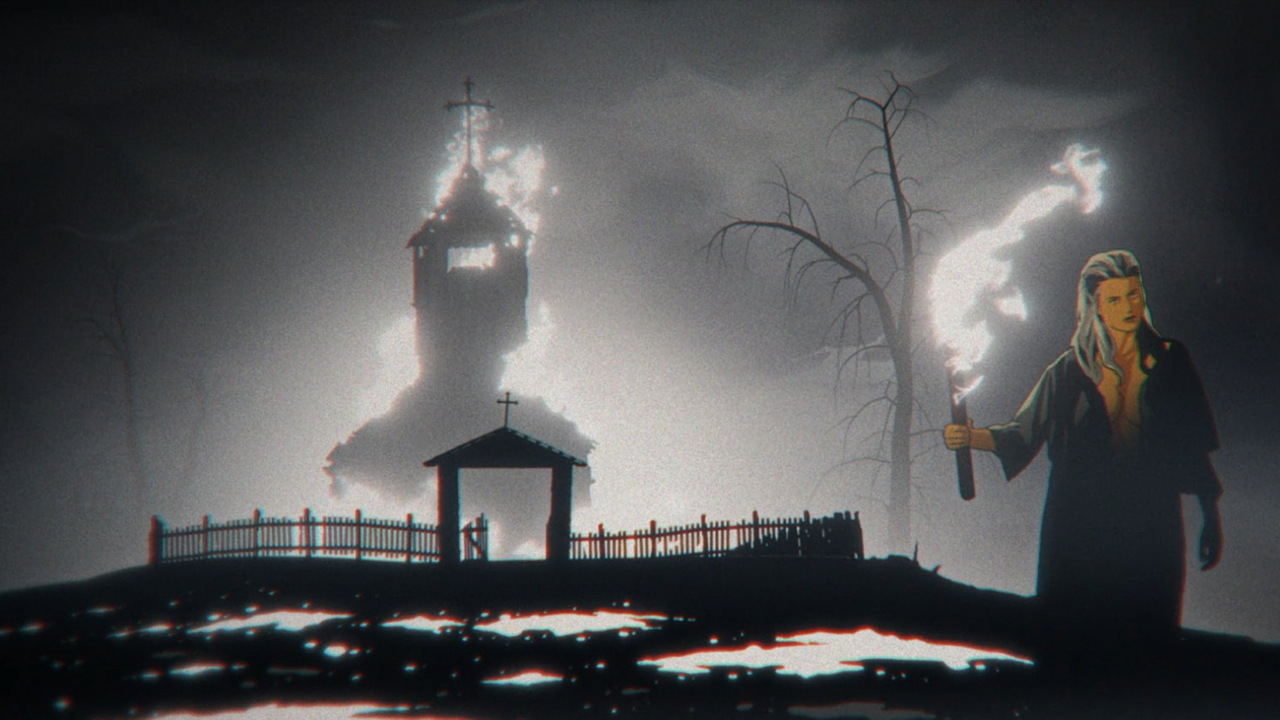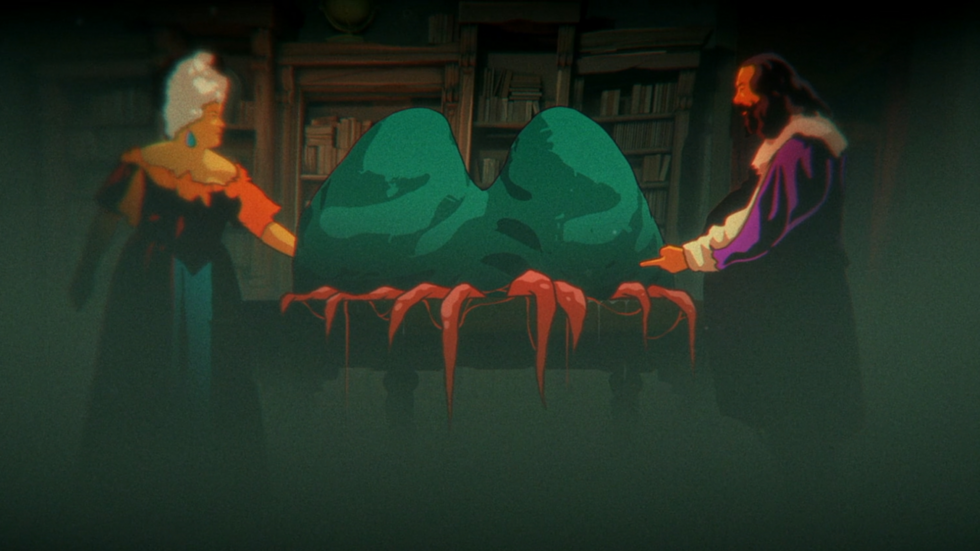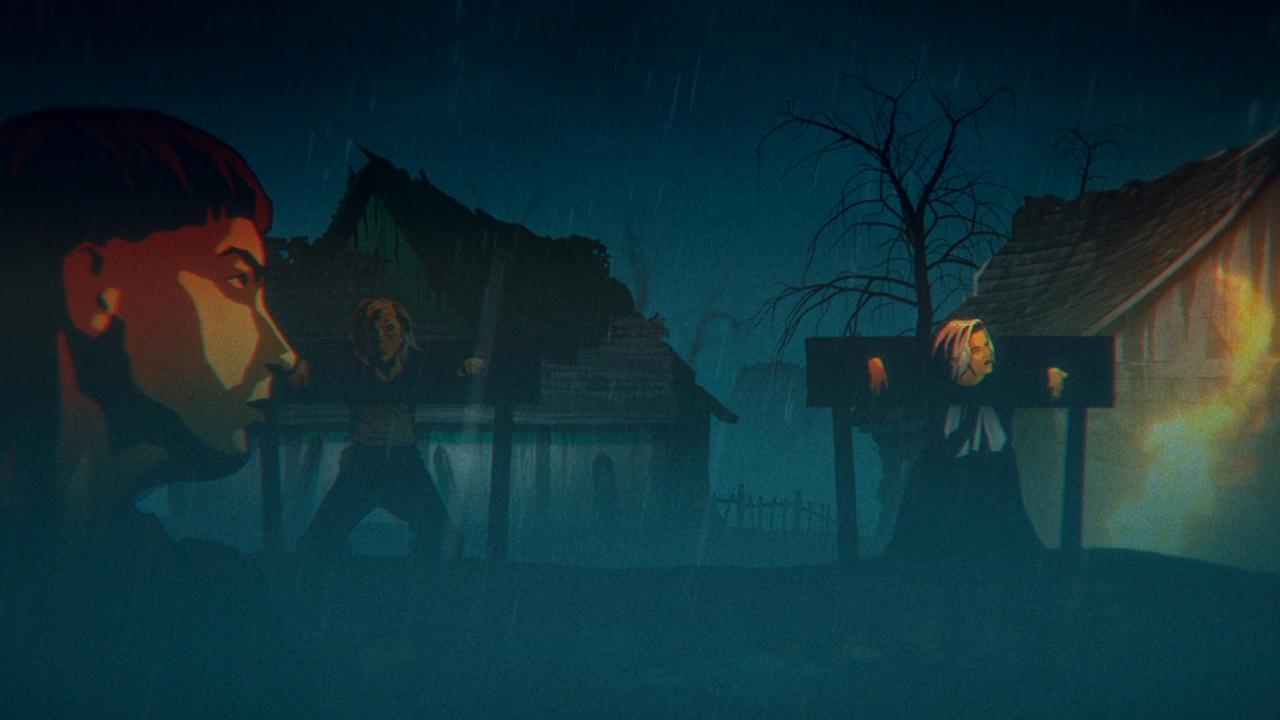Dog of God (2025): Aggregating Excellence
Holy fucking shit. This movie rules. We watched it as part of our coverage of Tribeca Film Festival 2025. Now don’t let the plethora of meaningful elements fool you; if you cut through all the chaff, Dog of God is at its heart a psychedelic-thriller-feminist-drama-pagan-horror-dark-comedy. Which is to say for all its layers, it’s also got a large cast of clearly defined characters who make illustrative choices that drive the plot in pointed new directions. There’s no fat in this piece—just a rich synth marinade. It’s probably more helpful to think of it as Metalocalypse (2006-2023) that takes itself (mostly) seriously.
Latvian director duo Raitis and Lauris Abele, brothers, explore the dichotomy between the church and the tavern as two separate houses of gluttony, the most underrated of the seven deadly sins. People shamble like zombies from the tavern. They shamble like zombies to the church. In one they get drunk on alcohol; in the other they get drunk on self-loathing; each one complements the effect of the other. The film’s sound design underscores the point. No one merely drinks. They gulp. Even the town’s Baron, himself engorged on decades of binge eating, is a glutton for power. He takes the sacrament with voracious desire. When the priest (Regnars Veivars) comes to him asking him to lend his troops, he agrees only after savoring a momentary power over the same church that lets him hate himself.
Decidedly not a glutton though is the town’s pagan healer, the tavern keeper (Agate Krista). She works hard, gets high after work is done, and works a little on the side to help desperate townswomen heal from a plague of boils. She does help the town numb themselves in the wake of church, which might cross the line into enabling their drunkenness, but that’s the worst of it. She takes her fate into her own hands despite the existing power structures. If the town can be seen as an existential wasteland full of people trapped in the gluttonous gravity of nihilism, then the one who rises above the pull of nihilism to command her own life would be a Nietzschean existentialist. While this doesn’t bother the Baron (Kristians Karelins), a simple glutton with a straightforward sort of power, it infuriates the priest, a more abstract glutton with a less direct sort of power. When we learn that witches exist by virtue of indulging in Devilish intemperance, we realize that this pagan healer is not a witch. Meanwhile the priest loves the signs of divinity more than he loves his flock and is also a gluttonous, lustful masochist dripping with the tar of excess. Learning this represents an interesting evolution in the church-tavern duality.
We can further understand this duality through the story of the church acolyte, Klibis, voiced by Jurgis Spulenieks. He lives a life of abuse and ridicule. Klibis is the one most directly oppressed by the church, until the dog of God, voiced by Einars Repse, strolls into his life. Klibis, who’s been treated like a lower being his entire life, finds the dog of God intriguing. Look at this warrior who calls himself a dog, a title all followers of God should be happy to bestow themselves in front of His great name. And he stands in juxtaposition to the wretched flock of the church. So Klibis decides to take matters into his own hands, delivering himself from his wretched existence by making a bold choice. Klibis becomes a Nietzschean hero as well. One who rejects the nihilistic mundanity of daily repetition to become something that operates for a purpose.
Now we’ve got two Nietzschean heroes emerging in this story—the pagan healer and Klibis. The only difference between the two is that the pagan, already living a life of temperance, makes a bold choice in a charged moment exposed to the cowardly, ignorant hypocrisy of the townsfolk, and delivers herself to the Devil whereas Klibis delivers himself to God.
It’s with these two characters' final decisions that we see the story not only establish the exploration of church vs tavern, but properly arc out that duality. The semiotic nuance, and clarity, at the level of each character in its large cast aggregates, making this a rare film where the central theme itself has a beginning, middle and end. The tavern keeper lives boldly, with moderation, and creates her own meaning in life. However her arc sees her, whatever the circumstances, give in to the gluttony of vengeance. Klibis lives in an ironic sort of nihilism serving the church before choosing to break his shackles and truly serve God. This story’s two Nietzschean figures find themselves on a collision course that leads to one of the coolest closing sequences you’ll ever see. It also leads to a satisfying thematic conclusion.
Dog of God manages to tell a gripping, character-driven story that uses the arcs of its many characters to potentiate its complex thematic arc that kicks into another gear for a badass climactic sequence. It’s also just pretty to watch and exquisite to hear. This thematic perfection combined with the absolute treat for the senses makes this one of the richest film experiences you will have in 2025.




Hi my name’s AP and I live in Bushwick where I spend most of my free time on my creative writing projects. I believe good film is art, good art is philosophy and good philosophy is science. The best kind of art revels in the play of thought and emotion.
Talk to me about The Matrix, Sword of Doom, The Human Condition Trilogy or anything by Denis Villeneuve.
More of my thoughts here. https://medium.com/@DiegeticThoughts